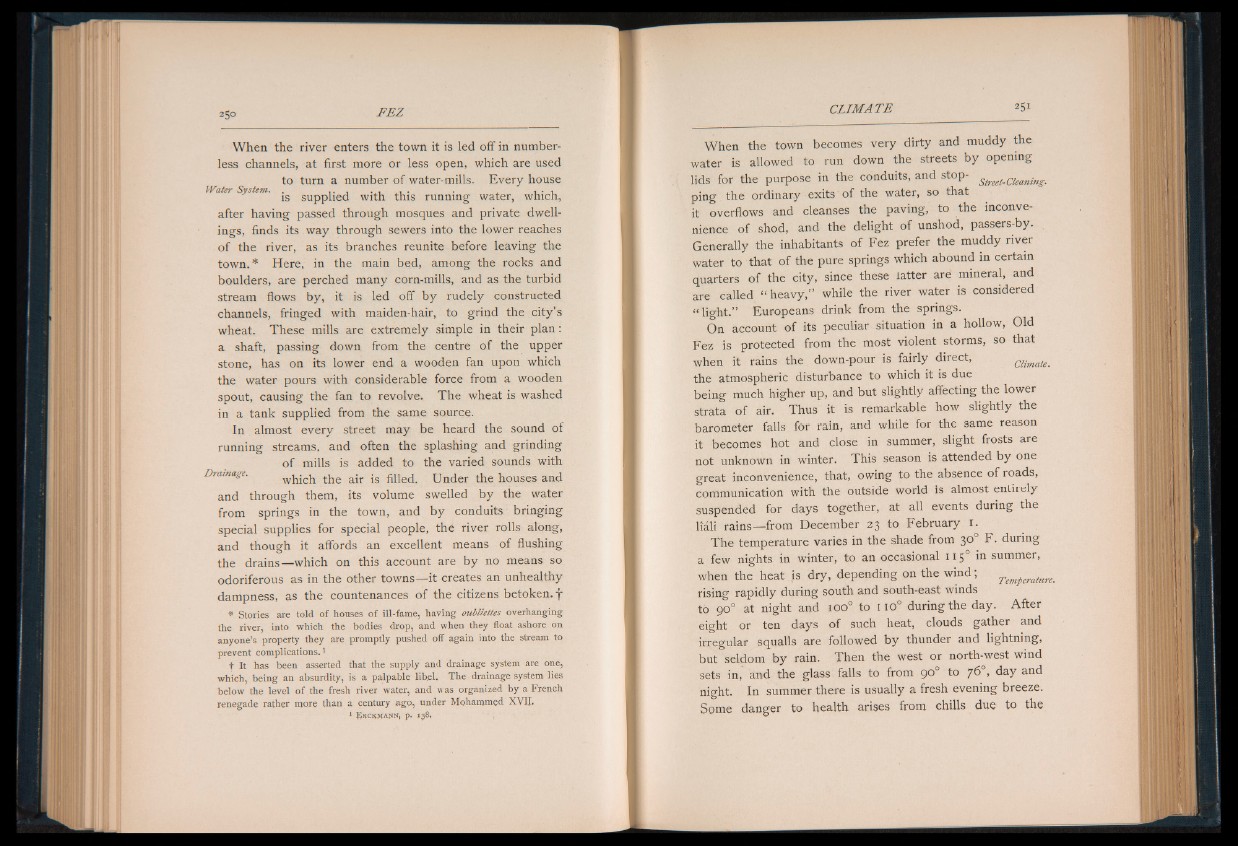
When the river enters the town it is led off in numberless
channels, at first more or less open, which are used
to turn a number of water-mills. Every house
Water System. SUpplie(j with this running water, which,
after having passed through mosques and private dwellings,
finds its way through sewers into the lower reaches
o f the river, as its branches reunite before leaving the
town.* Here, in the main bed, among the rocks and
boulders, are perched many corn-mills, and as the turbid
stream flows by, it is led off by rudely constructed
channels, fringed with maiden hair, to grind the city’s
wheat. These mills are extremely simple in their p lan :
a shaft, passing down from the centre of the upper
stone, has on its lower end a wooden fan upon which
the water pours with considerable force from a wooden
spout, causing the fan to revolve. The wheat is washed
in a tank supplied from the same source.
In almost every street may be heard the sound of
running streams, and often the splashing and grinding
o f mills is added to the varied sounds with
which the air is filled. Under the houses and
and through them, its volume swelled by the water
from springs in the town, and by conduits bringing
special supplies for special people, the river rolls along,
and though it affords an excellent means of flushing
the drains— which on this account are by no means so
odoriferous as in the other towns— it creates an unhealthy
dampness, as the countenances of the citizens betoken, f
* Stories are told of houses of ill-fame, having oubliettes overhanging
the river, into which the bodies drop, and when they float ashore on
anyone’s property they are promptly pushed off again into the stream to
prevent complications.1
t It has been asserted that the supply and drainage system are one,
which, being an absurdity, is a palpable lib.el. The drainage system lies
below the level of the fresh river water, and was organized by a French
renegade rather more than a century ago, under Mohammed XVII,
* Euckmaj™, p. 138,
When the town becomes very dirty and muddy the
water is allowed to run down the streets by opening
lids for the purpose in the conduits, and stop- Street.cleaning.
ping the ordinary exits of the water, so that
it overflows and cleanses the paving, to the inconvenience
of shod, and the delight of unshod, passers-by.
Generally the inhabitants of Fez prefer the muddy river
water to that of the pure springs which abound in certain
quarters of the city, since these latter are mineral, and
are called “ heavy,” while the river water is considered
“ light.” Europeans drink from the springs.
On account of its peculiar situation in a hollow, Old
Fez is protected from the most violent storms, so that
when it rains the down-pour is fairly direct, climate.
the atmospheric disturbance to which it is due
being much higher up, and but slightly affecting the lower
strata of air. Thus it is remarkable how slightly the
barometer falls for rain, and while for the same reason
it becomes hot and close in summer, slight frosts are
not unknown in winter. This season is attended by one
great inconvenience, that, owing to the absence of roads,
communication with the outside world is almost entirely
suspended for days together, at all events during the
liali rains— from December 23 to February 1.
The temperature varies in the shade from 30° F. during
a few nights in winter, to an occasional 115 in summer,
when the heat is dry, depending on the wind; Temperature.
rising rapidly during south and south-east winds
to 90° at night and ioo° to i i o ° during the day. After
eight or ten days of such heat, clouds gather and
irregular squalls are followed by thunder and lightning,
but seldom by rain. Then the west or north-west wind
sets in, and the glass falls to from 90° to 76°, day and
night. In summer there is usually a fresh evening breeze.
Some danger to health arises from chills due to the